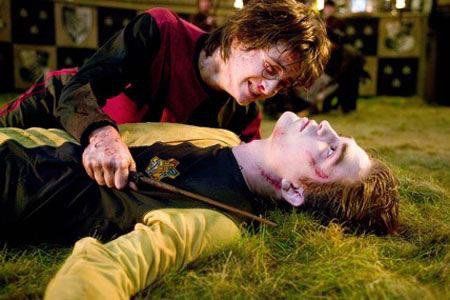What if you were kidnapped, tortured, witnessed the death of a friend, and finally, when you managed just barely to escape, you told someone who was responsible for the atrocities you'd endured, and you weren't believed? Your word is being questioned, either because the individual believes you are too young to know what you're saying, or because they've deluded themselves into believing their own personal truth. It could be a mixture of both. What would you do?
I just finished reading Harry Potter and the Goblet of Fire for the first time. I've loved all the other books, but the end of GoF just left me writhing in frustration. A frustration I know will worsen when I start Order of the Phoenix later this afternoon. Harry isn't believed by the Minister of Magic. He fought for his life with Voldemort and only just escaped. He feels helpless and weak, in terrible pain, fighting back memories of Cedric's death and what does Fudge do? He accuses him of having hallucinations and not being trustworthy because he's parseltongue.
Can you imagine the rage Harry must have felt? I've never undergone moments when my word hasn't been believed. I've never been looked straight in the eye by someone and know they don't believe a word I'm saying.
When Christ was placed on trial, when people proclaimed his death sentence, he underwent the same experience as Harry, all because people refused to believe the truth.
Why would lies be more prone to believe than truth? Why would people, especially people in authority, prefer to believe lies instead of deal with the truth and solve the problem? We've been doing this for centuries. When Hitler rose to power, the West turned a blind eye to him, refusing to believe him capable of the whispered atrocities. Even the neighbors of the Jews dragged from their homes ignored the niggling fear in their minds and believed instead they were merely being deported. By not finding out the truth, these people, these so-called innocents, were just as guilty as the murderers.
So were we, so was England, so was anyone and everyone who knew, deep down, that Hitler was a monster and yet chose to do nothing.
Fudge is one of these bureaucrats I despise so much. He chose to live in his perfect little world, uninterrupted by fear and truth. But does his preferred ignorance actually stop the danger from evolving? Of course not! And we have Harry, poor, desperate, terrified Harry who tries so hard to make people understand when they're just not capable of understanding. I admire Dumbledore. Far more than I thought possible. He never doubts Harry's word, never doubts what Harry saw and experienced. He's on the opposite end of the spectrum from Cornelius Fudge.
Just because we fear something doesn't mean we should not accept its existence.
Fear needs to be faced, it needs to be acknowledged and understood, and it needs to be fought. We only destroy ourselves by pretending evil doesn't exist. We make the end result far worse by not fighting back. We live in a world of evil. It may not seem as blatantly obvious as Voldemort, but it exists just the same. And we won't be believed when we speak out against evil, but it doesn't mean we shouldn't speak out anyway. A few seeds of truth will fall on fertile ground. When we let fear keep us silent, that is when we are truly lost. Harry will never reach that point in his life, and I pray that neither will I.


I have to wonder if Rowling is using the Ministry as a metaphor for liberalism, since it is devoted to covering up the truth and denying the existence of evil. This continues in the fifth book, with the installation of Professor Umbridge at Hogwarts. If you thought Fudge was bad, wait until you meet the pink-bejeweled Umbridge with her kitty plates and uncanny delight for punishing Harry for speaking up against her in class. =P
ReplyDelete